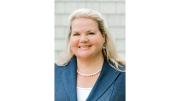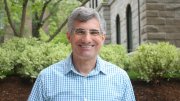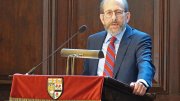The pandemic’s effects on classroom teaching were immediate and binary: given the dangers of viral transmission, courses last March were hurriedly adapted to Zoom, and, last fall, more refined versions of online pedagogy appeared (see “School Goes Remote,” November-December 2020, page 29). Health precautions and the collapse of travel similarly put the kibosh on the extensive in-person continuing and executive education programs run by Harvard Business School (HBS), the Faculty of Arts and Sciences’ Division of Continuing Education (DCE), and similar operations at many of the other professional schools—bringing much of a $500-million growth business to an abrupt halt (see harvardmag.com/covid-fy-losses-20).
But those headline changes have obscured another development. Millions of people with time unexpectedly on their hands found themselves eager for new diversions—including online courses that can satisfy a curiosity, broaden one’s learning, explore a fresh skill, or even provide the know-how and credentials to prepare for a new line of work. The result is booming enrollments in Harvard’s diverse online offerings. That alone won’t remedy the financial damage from shuttering lucrative in-person continuing and executive-education classes. But the burgeoning interest does suggest the broad appeal of Harvard instruction, its potential audience when the constraints and expense of travel and in-residence classes are relaxed, and even ways in which on-campus degree programs might be augmented in the near future.
One early indication of interest appeared at Harvard Summer School, a DCE unit, which operated entirely online. As its dean, Sandra Naddaff, reported to the Faculty of Arts and Sciences (FAS) last December, 2020 enrollment increased more than 13 percent, to nearly 10,800—a record. Some 1,250 students came from Harvard (compared to perhaps 500 or so in a typical year); that surge in part reflects both the cancellation of study-abroad programs, and various fee waivers for some College enrollees. But enrollment also rose as other students sought enriching summer academic experiences—some of them, no doubt, who could not have afforded it in residence. Naddaff anticipates robust enrollment again this summer (again all online)—not least because the College is offering two free four-credit courses to all students who studied remotely throughout the current academic year. In all, the Summer School is reinventing itself in this its sesquicentennial year.
DCE’s Extension School (with nondegree, undergraduate, and graduate programs), has been an online-education pioneer, but it effected a significant transition, too. In the fall of 2019, it offered 462 courses (of which 358 incorporated some distance learning, including many hybrids combining online and in-person sessions); in the pandemic fall of 2020, it had 502 offerings, all conducted on a virtual basis—a huge curricular revamping (given the discontinuation of all exclusively in-person classes).
Despite the loss of those in-person courses, Extension School enrollment rose more than 5 percent, to 11,685, last fall, and course registrations rose even more robustly, by more than 8 percent, to 17,294. Among them were students from 25 countries new to the school’s global roster. The increase in on-demand (asynchronous) offerings from seven to 81 made it easier for students to participate across distant time zones, further facilitating the school’s global reach. (Preliminary data for spring 2021 show enrollment up 13 percent from the prior year, and course registrations up 15 percent.)
Nancy Coleman, who became dean of continuing education in July amid the pandemic-driven transition, noted that the 2020 enrollment surge included interest not only in professionally related subjects, but in liberal-arts fields “across the board” (even in such subjects as languages, where interest had been declining): an indication of learners seeking “personal enrichment.” The Extension School has an “earn your way in” model, she continued: students take prerequisites, show they can do the work well, and then can apply for admission to degree programs. Given the fall bulge, she said, the school has seen “more applications for the spring admissions cycle than we have ever seen before.” And with rising interest among international learners—a tempting market the school has pursued only episodically in the past—she expects to be more intentional about such outreach: adding class sections at different times, and offering more on-demand sessions.
Having established that it can serve students with diverse interests well, across a broad range of disciplines, the division/school is thinking expansively. Its mission, Coleman said, “is really to extend Harvard to students who cannot study here full time”: seemingly, a global cohort. Doing so will involve further developing online methods for effecting student-faculty and student-student interactions and connections, and exploring other Harvard schools’ interests in serving their extension students similarly.
Given DCE’s “incredible expertise,” she said, there are many ways to share across the University—and to extend temporally, toward the holy grail of the “60-year curriculum”: lifelong learning, driven by interests and continual refinement of skills. From the summer school through the array of Extension School courses and professional-school continuing-education programs and on into retirement, Coleman said, “We’re really proud of offering opportunities across the life spectrum.” On tap might be courses aimed at filling gaps where the school could offer other kinds of certificates; “stackable credentials” (something less than complete degree programs); and more hybrid courses that include some in-person class sessions—at sites in Greater Boston, and in other Harvard venues worldwide.
Some of these ventures have been under consideration or development, or even tested in the field. But clearly, under the pressure of the pandemic, which necessitated breaking geographic boundaries and time zones to extend teaching and learning, the DCE has accelerated its plans, and widened their scope.
The ultimate interest-driven learning experience, of course, is the sort of free online classes initially called MOOCs (massive open online courses), offered since 2012 on edX (unveiled jointly by MIT and Harvard) and peer platforms. And how did the pandemic affect HarvardX? Enrollments in Crimson courses on edX rose from somewhat fewer than 1.9 million in 2019 to nearly 9.6 million in 2020. As in DCE, interest spanned the spectrum, from the humanities and sciences to business. Before 2020, HarvardX reports, only three courses attracted enrollments of 80,000 or more; last year, 25 did, from “Entrepreneurship in Emerging Economies” and “Rhetoric: The Art of Persuasive Writing and Public Speaking” to “Mechanical Ventilation for COVID-19.”
Although comparable data for the paying cohort are not released, it increased more than 400 percent—again, with interest across the disciplines and professions. (In return for a fee, learners can obtain a “verified certificate” of coursework completion: $199 for the ever-popular “Introduction to Computer Science,” $169 for “Rhetoric,” and so on.) Obviously, that could become a source of significant revenue at scale, for an operation that has on its own depended principally on philanthropic support and University funds. (edX announced on December 15 that across its platform—with 160 partner institutions—annual course registrations grew by 29 million in 2020, to 110 million, with the number of new users up 161 percent, to 35 million individuals, who collectively were issued some 2.1 million certificates. Combined with its business clients, who pay for corporate training, edX, which keeps a wary eye on commercial competitors, may be generating increasingly meaningful sums.)
Over time, these burgeoning online extensions of Harvard teaching may also confer some reciprocal lessons on campus-based education. During “Teaching in Unprecedented Times,” a January showcase of fall 2020 developments presented by the office of the vice provost for advances in learning, new HBS dean Srikant Datar outlined some interesting prospects. Classes might be delivered in chunks, for one: a budding entrepreneur could tune in to lessons about how to assess a market, then apply those skills, then return for instruction on how to scale her fledgling business—learning and immediately applying in an interactive cycle, at whatever stage of life or business development she found herself. Similarly, HBS classes in Allston could allow alumni practitioner-learners in, virtually—and their participation in case discussions could bring immediate insights to the M.B.A. candidates seated in the learning theaters.
That sort of two-way innovation, with improved residential education, was a strategic goal for Harvard’s $30-million edX investment. Ironically, it may have taken a pandemic, the interruption of in-person learning, and a worldwide appetite for online courses, to begin to bring that idea into the Harvard classes of the post-pandemic future.








